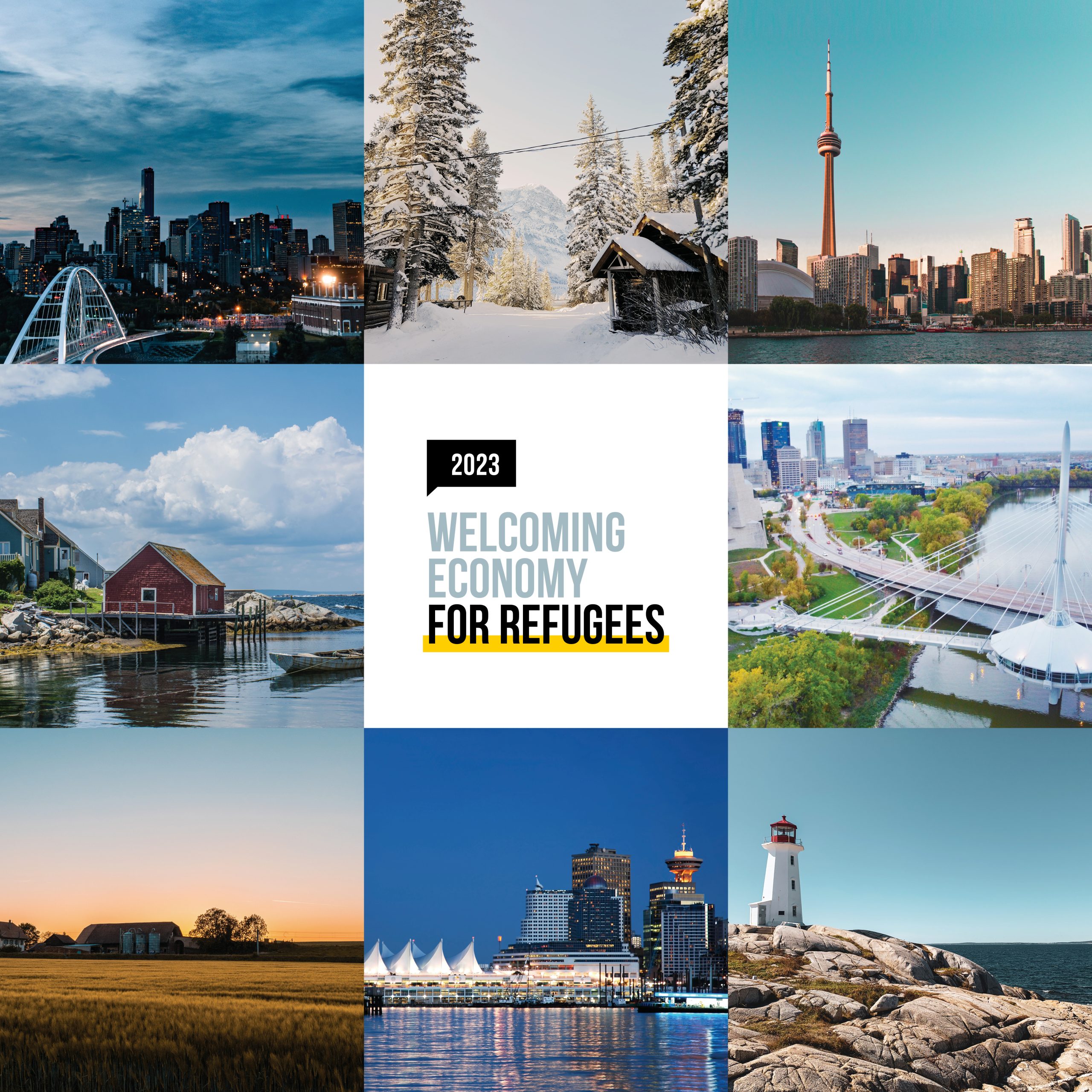News /
#WelcomingEconomy for Refugees Sends Message that Refugees Mean Business
#WelcomingEconomy for Refugees Sends Message that Refugees Mean Business
Refugees offer an untapped wealth of talent for Canadian employers: this is the message of #WelcomingEconomy for Refugees, a Canada-wide bilingual campaign launched today to help employers connect with refugees eager to employ their talents in Canada’s workforce.

TORONTO, ON – (June 1, 2023) Refugees offer an untapped wealth of talent for Canadian employers: this is the message of #WelcomingEconomy for Refugees, a Canada-wide bilingual campaign launched today to help employers connect with refugees eager to employ their talents in Canada’s workforce.
The month-long campaign is sponsored by the Refugee Jobs Agenda Roundtable, which provides a platform for employers, employment, and immigrant-serving agencies and government representatives to work together on increasing refugees’ access to meaningful employment opportunities. The Roundtable is co-chaired by The Honourable Ratna Omidvar, Rashmi Vohra of TD Bank Group, and Jim Estill of Danby Appliances.
“Welcoming refugees is a humanitarian investment that can yield huge economic dividends for Canadians,” says Roundtable Co-chair Jim Estill. “Refugees bring education, experience, and talent – along with initiative and determination – at a time when businesses are struggling to find and keep workers. The #WelcomingEconomy for Refugees campaign helps employers connect with resources they need to capitalize on the skills and talents of Canada’s refugees.”
Canadian employers currently face one of the most serious labour shortages in decades, with job vacancies around 1 million. A declining birth rate, coupled with mass retirements, means that Canada’s labour force growth will soon be fueled 100 percent by immigration, including refugees. The skills and experience of refugees represent an untapped economic resource for Canada and a potential new supply of talent for employers seeking skilled workers.
“The #WelcomingEconomy for Refugees campaign can connect business leaders with resources and tools needed to help build a welcoming, diverse, and inclusive workplace,” says Rashmi Vohra. “Refugees can help fill gaps in the workforce, by bringing professional expertise and a diversity of knowledge, education and experience.”
“With ever-increasing numbers of refugees, displaced for longer periods of time, it is clear that businesses have a more important role than ever before in supporting successful integration of refugees into Canada’s workforce,” says The Honourable Ratna Omidvar.
“Most refugees come to Canada with few financial resources,” The Honourable Ratna Omidvar adds. “They most often learn a new language and adapt to a new culture. Despite these challenges, research shows that refugees do not simply benefit from the safety Canada gives them. In fact, refugees embrace the opportunity that Canada provides to build a better life and become important contributors to the country’s economy and cultural diversity.”
The #WelcomingEconomy for Refugees is a coordinated employer-led national communications campaign anchored in communicating refugee success stories, exploring the business case for hiring refugees at levels commensurate with their education, and demonstrating the ways in which refugee contributions are critical to thriving communities to encourage Canadian employers to hire refugees.
This year, the campaign has over 80 partner organizations. The www.welcomingeconomy.ca website includes practical resources and tools to support employers in their refugee hiring and integration needs. The campaign also includes a video series featuring some refugee success stories, extensive social media posts to be shared by campaign partners and will run throughout the month of June and a Refugee Hiring Event taking place in Moncton, NB on World Refugee Day on June 20, 2023.
Quick Facts:
● Over time, refugees pay more in income tax on average than they receive in public benefits and services. However, this does not represent all taxes paid (like sales taxes) since it only includes income tax. Refugees increasingly narrow the gap between income tax paid and public benefits and services received the longer they live in Canadian provinces and territories.
● Refugees use their diverse skillsets and talents to start businesses and create jobs for themselves and other Canadians. Including those who are self-employed and those who own companies, 14.4 per cent of refugees who have been in Canada between 10 and 30 years are entrepreneurs, compared to 12.3 per cent of people born in Canada.
● Canada has an aging population, with the average age increasing 8.8% from 2016 to 2020. Refugees are on average, 11.1 years younger than those born in Canada, which means they are more likely to be of working age.
● Refugees have resettled in every part of Canada – as far north as Whitehorse, Yukon; as far east as St. John’s, Newfoundland; and as far west as Prince Rupert, British Columbia. Of refugees who arrived between 2011 and 2016, 48% live in smaller cities and towns, compared to 44% of all immigrants.
(Source: UNHCR Report: Refugees in Canada)
List of partner organizations:
- ACCES Employment
- Achēv
- ALAC
- Associations for New Canadians
- Au coeur de l’enfance
- BAM – Books Art Music Collective
- BC4Afghans Community Services Foundation
- Calgary Catholic Immigration Society (CCIS)
- Calgary Immigrant Women’s Association (CIWA)
- Canadian Chamber of Commerce
- Carty House
- Catholic Social Services
- Change It Up Professional Development
- Christie Refugee Welcome Centre
- CIBC
- City of Toronto
- COSTI Immigrant Services
- Calgary Region Immigrant Employment Council (CRIEC)
- Danby Appliances
- Diversity Institute
- Durham Region Unemployed Help Centre
- East West College of Business and Technology
- Edmonton Chamber of Commerce
- Edmonton Region Immigrant Employment Council (ERIEC)
- EduNova Co-operative Ltd
- Future Ready Initiative
- Halifax Partnership
- Hire Immigrants Ottawa (HIO)
- Hooyo Innovation Hub
- Immigrant Centre Manitoba
- Immigrant Employment Council of BC (IECBC)
- Immigrant Services Association of Nova Scotia (ISANS)
- Impakt Foundation
- Jumpstart Refugee Talent
- JVS Toronto
- Kibbi Technologies
- Les Entreprises SmartLux Inc
- Lifeline Afghanistan
- Lutherwood Employment
- Magnet
- Manitoba Association of Newcomer Serving Organizations (MANSO)
- Manitoba Start
- Matrix Logistics
- Multi-lingual Orientation Service Association for Immigrant Communities (MOSAIC)
- N.E.E.D.S. Inc. (Newcomers Employment and Education Development Services)
- New Brunswick Multicultural Council (NBMC)
- New Canadians
- NinthPlanet
- Northpine Foundation
- Ontario Tourism Education Corporation (OTEC)
- Opportunities for Employment (OFE)
- Peel Halton Workforce Development Group
- Refugee 613
- Regina Open Door Society Inc
- Region of Durham
- Regional Connections – Immigrant Services
- Rural Manitoba Immigrant Employment Council (RMIEC)
- Saint John Newcomers Centre
- Saskatchewan Chamber of Commerce
- Saskatoon Open Door Society
- Scale Without Borders
- Starbucks Canada
- Syrian Canadian Foundation
- Talent Beyond Boundaries
- TD Bank Group
- Tent Partnership for Refugees
- The Conference Board of Canada
- The Multicultural Council of Windsor and Essex County
- The Refugee Centre
- Toronto Metropolitan University (CERC)
- Toronto Region Immigrant Employment Council (TRIEC)
- Vancouver Public Library
- Western Financial Group
- WILL Immploy
- Windmill Microlending
- WithYouWithMe
- WoodGreen Community Services
- Workforce Collective
- World Education Services (WES)
- World University Service of Canada (WUSC)
For more information, contact the Strategic Coordinator of the Refugee Jobs Agenda Roundtable,
Daniel Cervan-Gil, Associate Director, Employer Initiatives, World Education Services.
Other News

Canadian Chamber Statement on Immigration Targets Cuts

The Small Businesses Projecting Growth Aren’t Those You Expect, Says Canadian Chamber Report




